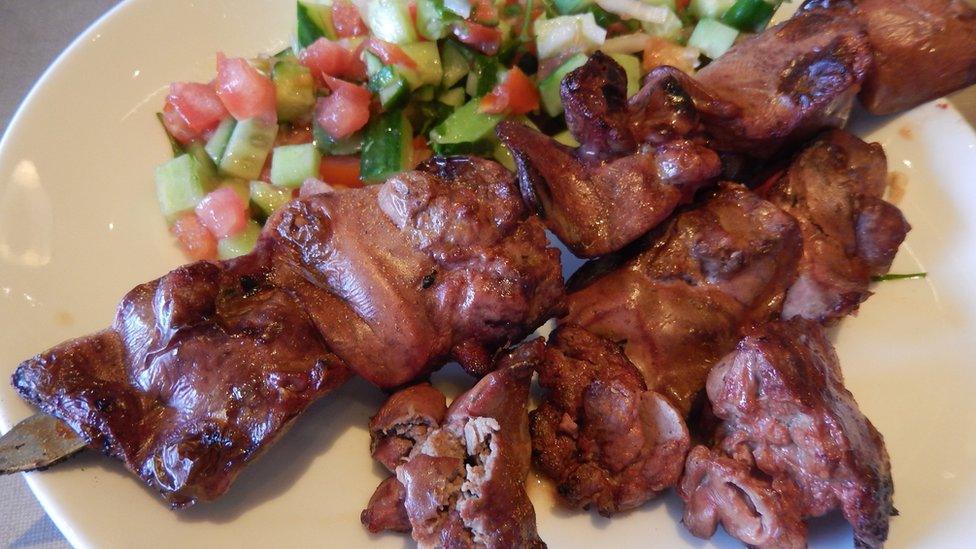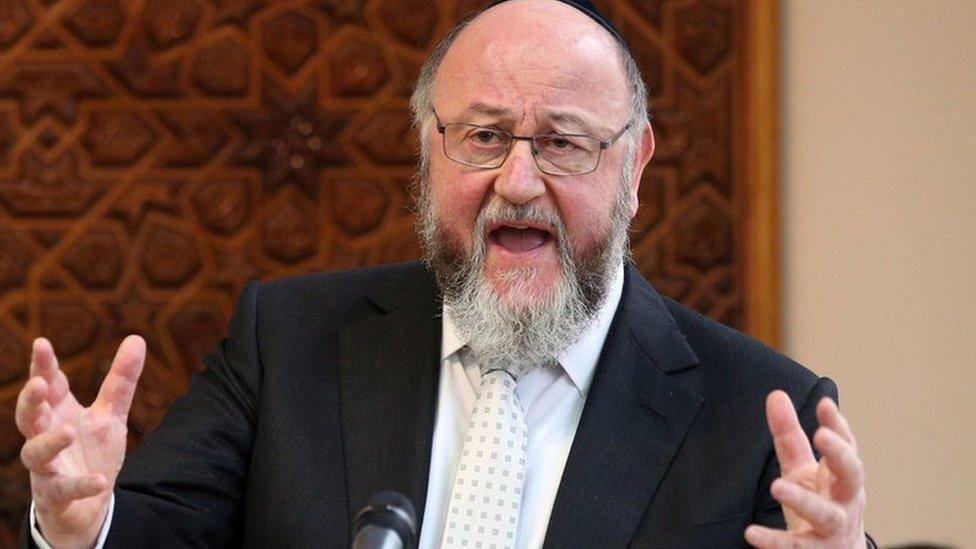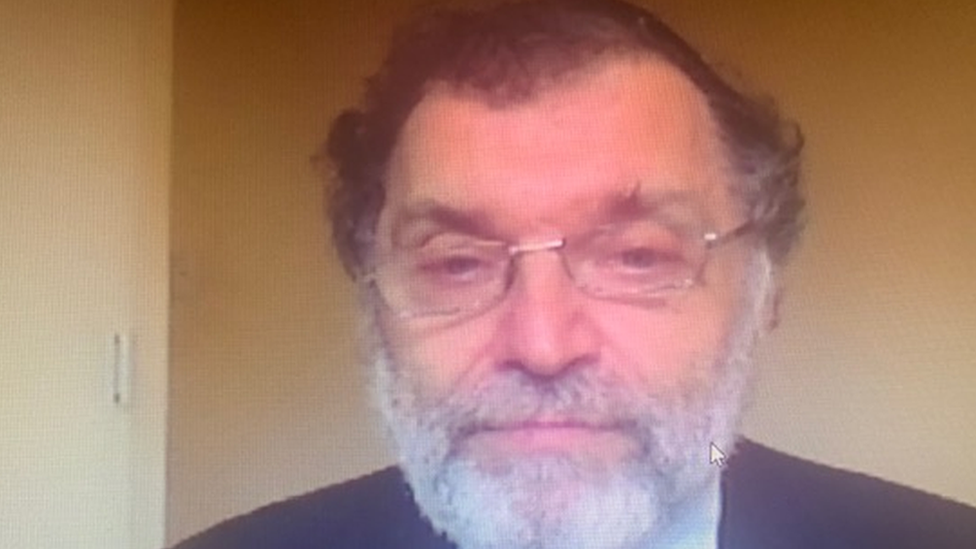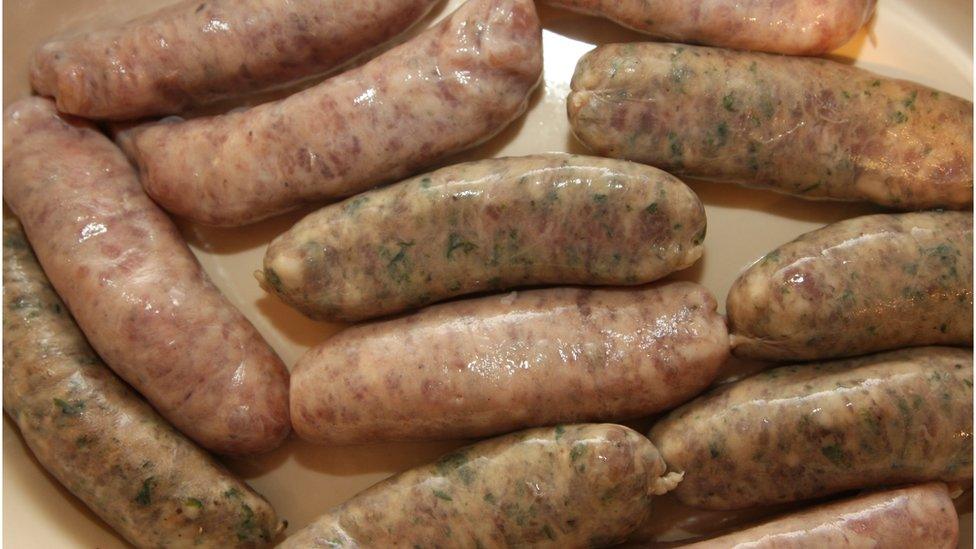Brexit: NI Jewish community 'at risk' over chilled meat ban
- Published

A solution is needed to ensure Northern Ireland's Jewish community can continue to get kosher food despite a chilled meat ban linked to the NI Protocol, the UK's chief rabbi has said.
The protocol is the part of the Brexit deal that creates a border in the Irish Sea.
Northern Ireland's Jewish community has warned its traditions are threatened by the ban, which affects some meat.
The community said the cost of importing from the EU was prohibitive.
Rabbi Ephraim Mirvis said communal life risked becoming "unviable".
The Reverend David Kale, a minister for Belfast's Jewish community, said he feared the ban would "cause the community to completely die".
In a statement, Rabbi Mirvis said the challenges faced by Northern Ireland's Jewish community were an example of "inadvertent collateral damage arising out of current trade differences between Britain and the EU".

Chief Rabbi Ephraim Mirvis says a solution must be found urgently
He said a solution must be found "for this precious and historic Jewish community, enabling them to bring in essential food provisions, and items required for the observance of festivals".
"These are existential concerns, because there is a growing risk of communal life becoming unviable," he said.
Rabbi Mirvis said he was grateful to Northern Ireland Secretary of State Brandon Lewis for a commitment to work with EU counterparts on finding a way forward.
The Jewish community has had a presence in Northern Ireland since the mid-18th Century.
At its peak, there were about 1,500 members but the population has been in sharp decline and there are now fewer than 100.
NI Agriculture Minister Edwin Poots said it was "yet another example" of how the protocol was affecting "not just businesses, but individuals, in how they go about everyday life".
"Due to the complexity of the certification process and ongoing veterinary capacity issues, GB traders report that it is difficult and costly to obtain veterinary export certification for small volumes of product and mixed loads," said Mr Poots.
"What happens after the grace periods is creating uncertainty around future trading and currently we have no clear definitive simplified process as to how people and businesses will access certain products."
Mr Poots called for "permanent solutions", saying he would "continue to push the UK Government and EU to make sure that Northern Ireland's businesses and people are not disadvantaged".
Government urged to take action
The protocol is the part of the Brexit deal that creates a trade border in the Irish Sea in order to prevent a hardening of the Irish land border.
It keeps Northern Ireland in the EU single market for goods and means EU customs rules are enforced at its ports.
It was agreed by the UK and EU in October 2019 and was subject to further negotiation and agreement in 2020.
The community said importing chilled meat from the Republic of Ireland was prohibitive due to costs.
It argued this was due to a range of factors including:
Exchange rate costs as the Dublin community purchases its food from mainland Europe in euros
Import costs as goods are "travelling a long way from Europe". It said meat suppliers charge not only for the meat, but for travel costs
Carrier costs to courier products from Dublin to Northern Ireland, including motorway toll costs
The EU does not generally permit the import of chilled meat products like mince and sausages from non-member states but the EU and UK have agreed to extend a so-called grace period - the time before the ban comes into effect.
The new arrangement means the meat ban will be postponed until 30 September.
Earlier this week, the chief rabbi joined leaders from Northern Ireland's Jewish community as well as the president of the Board of Deputies of British Jews in a meeting with the Northern Ireland secretary.
They urged the government to take action to avoid the collapse of the small local community when the ban on some meat products comes into effect.
The Board of Deputies of British Jews, which represents the interests of the British Jewish community, explained in a briefing paper that kosher meat for Northern Ireland was sourced from Manchester.
'Nobody can live without eating'
Mr Kale, a minister for the Jewish community in Belfast who attended that meeting, said he feared for the future.
"Everybody in the community is very worried and it's a topic of conversation every time I meet people," he said.
He said he believed an exemption should be made for kosher food on the grounds of religion.

The Reverend David Kale says everyone in Northern Ireland's Jewish community is very worried about the situation
"Our religion requires us to eat kosher and, unfortunately, nobody can live without eating," he said.
Mr Kale added that elderly members of the community in care homes and those in hospital depend on kosher meals-on-wheels that are delivered from Great Britain and that restrictions on meat imports could also have affect on attracting future rabbis to Northern Ireland.
He said part of his remit was to ensure kosher food was available to the community.
'Talking about an exodus'
On Thursday, Mr Lewis said disruption to the importation of kosher food from Great Britain to Northern Ireland due to the protocol was a "real and stark reminder" of the challenges ahead.
Speaking to the think tank Policy Exchange, he said a threat to the future of Northern Ireland's Jewish community as a result of the protocol was something "none of us can tolerate or be willing to accept".
On Wednesday, Prime Minister Boris Johnson said recent problems over the movement of chilled meats from the rest of the UK were still "far from fixed" following the agreement to delay the implementation of border checks.
Giving evidence to the Commons Liaison Committee, Mr Johnson acknowledged the community's concern that it would be unable to access kosher foods unless the issue was resolved.
"They are talking now about an exodus from Northern Ireland. We want to do everything that we can to avoid that," he said.
In a statement, the UK government said it recognised the importance of ensuring the Jewish community "can continue to access kosher meats and that the process of getting these goods to them is as smooth as possible for traders".
It added: "This is a further example of how the protocol as currently operated is causing very significant challenges for people in Northern Ireland. We continue to work in good faith to find solutions."
Related topics
- Published30 June 2021
